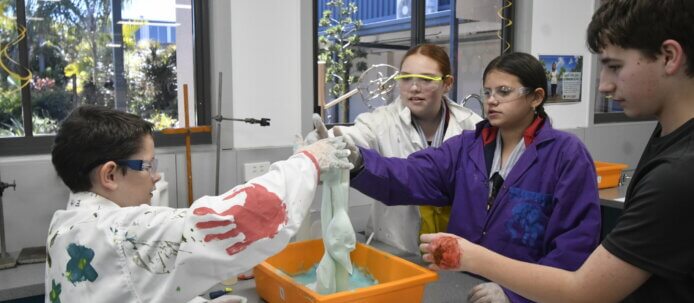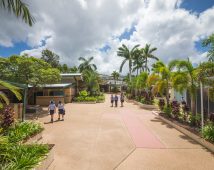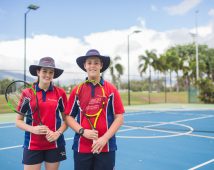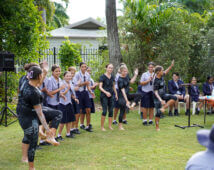Inclusive Curriculum and Enrichment
The belief that each person is created in the image of God leads us to respect the dignity and value of all. Therefore Catholic Education is challenged to provide opportunities that enable each person to grow to “full stature in Christ” (Eph 4:13)
Inclusive practice reflects these beliefs and is integral to the ethos of a Catholic school. Inclusive practice is not restricted to a particular group of learners or pedagogy but refers to all in our school community. This ensures that maximum quality learning opportunities are accessible to all learners.
Emmaus College actively and systematically promotes inclusive practice by:
- Identifying and removing barriers to inclusiveness in policies, structures and attitudes
- Providing a curriculum that strives to educate the whole person and meet the needs of each individual
- Assisting all learners to grow to their full potential
- Recognising and celebrating a broad range of achievements and efforts
- Offering a flexible, safe, enjoyable, and challenging learning environment
- Promoting a collaborative approach to meeting the needs of learners.
Clientele
A large number of students across a variety of need are supported by the Inclusive Curriculum and Enrichment Department. These include:
- Students with a verified disability such as Speech Language Impairment, Physical Impairment, Hearing and Visual Impairment, ASD, Social and Emotional Disorders
- Students with non-verified learning difficulties, particularly in Literacy and Numeracy
- Students in the Care of the State
- Students with English as a Second Language or Dialect
- Students with extension learning needs
- Aboriginal and Torres Strait Island students, particularly those with EAL/D needs
Staffing
There are approximately sixteen Teacher Assistants spread throughout both the junior and secondary campuses each lesson. These TA’s have regular training in facilitating learning for EAP and LD students and work in partnership with classroom teachers.
Processes for identifying and reviewing students with specific learning needs
- The processes begin with initial transition in Year 7
- Information for Primary students already verified in Catholic Education is passed on by the school and the Regional Coordinator
- Information specific to verified students is collected from State Schools where students have elected to enter the Catholic system
- Students with a verification have the Inclusive Curriculum Coordinator and Regional Coordinator on their interview panel so a specific support plan can be developed prior to the student attending high school. This is for students coming from both Catholic and State Primary schools
- Several transition days are conducted for students with verification or students with identified Learning Difficulty
- Information is collected for students coming from the State system through the previous school and parents
- Anecdotal information is shared directly at meetings between the different Primary schools and Emmaus. Support plans are developed further with this information and they are hyperlinked to the particular student’s name on an Excel spreadsheet and placed on TASS for the information of staff. These notes include both specific and generic information relating to the particular child, how they best learn and which teaching strategies and behavioural strategies have been found to be the most effective.
- Every verified student has an Individual Education Plan which details strengths and challenges. This document is reviewed and updated each year in liaison with the parent and is signed off by the parent, principal and Inclusive Curriculum coordinator.
- Every verified student and students identified with Learning Difficulties have an Individual Learning Plan (ILP) which is developed in liaison with the student’s teachers and with parents. This plan contains subject specific goals and learning strategies particular to the individual. This is reviewed each year and is signed off by the parent, principal and Inclusive Curriculum coordinator.
- Each verified student has an established process of monitoring which involves formal assessment and review of their disability according to the requirements established by the verifier. This is supported by processes such as: extensive student profiling, data collection and report writing. These documents are mostly mandated and the templates are provided by the DCEO.
- Students requiring support are further highlighted by academic performance and to a certain extent behaviour and engagement. Classroom teachers also refer students they are concerned about.
- Identification and referral generates testing – initially this will be through:
- Neale testing for Reading Age and Comprehension (Teachers and TAs trained)
- Fitzroy placement test which indicates the student’s academic year level
- Dyslexia Screener which indicates whether or not the student has dyslexia (Teachers and TAs trained)
- CogMed (Teachers and TAs in training presently)
- Probe 2 (New literacy assessment program designed to assess value added post intervention and to facilitate placement and modified program access)
- Data is ratified further through NAPLAN results and the CAT (Cognitive Assessment Test) taken by all students in the school
- PATM testing has recently been introduced which establishes a student’s level of performance in Maths and whether or not intervention and support is required in this area
- Students of concern are then taken through formal screening:
- WISC testing for cognitive data – psychologist
- CELF 4 testing for speech language impairment – speech therapist
- SED diagnosis (Including high level anxiety) through psychiatric or paediatrician assessment and report
- WIAT-II (Dyslexia diagnosis) through psychologist
Program Development
- Year 7 Intervention Literacy and Numeracy Programs
- Year 8 Intervention Literacy and Numeracy Programs
- Year 9 Literacy and Numeracy Support Programs
- Year 10 Literacy Short Course
- Years 7, 8 and 9 ESL English Program
- Years 11 and 12 ESL (Board Subject)
- Boys Group, Junior – Challenger and Fishing Club
- Girls Group, Junior – friendship and self-care
- Girl’s Group Senior – friendship and self-care
- CogMed Junior Program
- CogMed ESL Program
- Verbalisation and Visualisation Program
- Zuu – for both Junior and Senior boys. The school has supported the training of 3 staff members to certificate level in this program which is designed to develop appropriate interactive behaviours and self-management skills
MORE INFORMATION
Justine Brettell
Head of Inclusive Curriculum and Enrichment
Justine_Brettell@rok.catholic.edu.au






